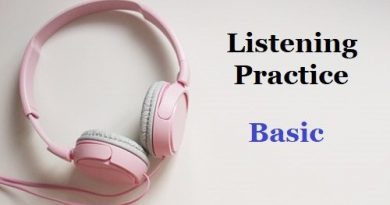Japanese basic listening practice lesson 10
Hello everyone! Today Learn Japanese Daily will introduce to you the Japanese basic listening practice lessons. Let’s start with : Japanese basic listening practice lesson 10
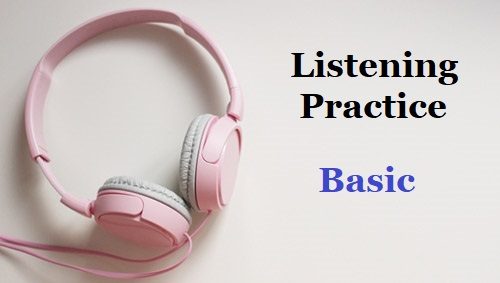
Contents
- 1 Lesson 10 : 何をしに行きますか。(Nani wo shi ni ikimasuka.) : What are you going there for?
- 1.1 1. 会話を聞いて例のように正しい答えを選んでください。 Tsugi no bun wo kiite kudasai. Sono bun to e ga atte itara 〇, chigatte itara ✕ wo tsukete kudasai. Choose correct answer as in the example.
- 1.2 2. 短い会話を聞いてください。次に a・b・c の文を聞いて、会話の内容と合っているものを一つ選んでください。 Mijikai kaiwa wo kiite kudasai. Tsugi ni a, b, c no bun wo kiite, kaiwa no naiyou to atte iru mono wo hitotsu erande kudasai. Listen to the short dialogue. Choose the correct message as in the example.
- 2 Japanese basic listening practice lesson 10
Lesson 10 : 何をしに行きますか。(Nani wo shi ni ikimasuka.) : What are you going there for?
1. 会話を聞いて例のように正しい答えを選んでください。
Tsugi no bun wo kiite kudasai. Sono bun to e ga atte itara 〇, chigatte itara ✕ wo tsukete kudasai.
Choose correct answer as in the example.
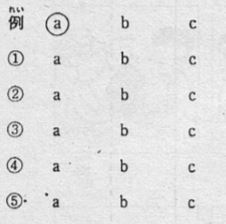
Script and answer
例
女:リーさん、大きなかばんですね。
男:ええ、この中にはタオルやいろいろなものがあります。友達と泳ぎに行きますから。
[リーさんはどこへ行きますか。] a. 海 b. 山 c. 駅
onna : Rii-san, ookina kaban desu ne.
otoko : ee, kono naka ni wa taoru ya iroiro na mono ga arimasu. Tomodachi to oyogi ni ikimasu kara.
[Rii-san wa doko e ikimasuka.] a. Umi b. Yama c. Eki
Woman : Mr. Lee, that bag is big.
Man : Yeah, there are towels and other things in this bag. I’m going to swim with my friends.
[Where is Mr. Lee going?] a. Beach b. Mountain c. Station
①
女:リーさん、かぜですか。
男:ええ、ちょっと頭が痛いです。薬を買いに行きます。
[リーさんはどこへ行きますか。] a. 靴屋 b. すし屋 c. 薬屋
onna : Rii-san, kaze desuka.
otoko : ee, chotto atama ga itai desu. Kusuri wo kai ni ikimasu.
[Rii-san wa doko e ikimasuka.] a. Kutsu-ya b. Sushi-ya c. Kusuri-ya
Woman : Mr. Lee, do you have a cold?
Man : Yeah, I have a slight headache. I’m going to buy medicine.
[Where will Mr. Lee go?] a. Shoe store b. Sushi bar c. Drugstore
②
女:リーさん、その箱は何ですか。
男:日本人形です。母に送ります。今からこれを出しにいきます。
[リーさんはどこへ行きますか。] a. 銀行 b. 郵便局 c. 空港
onna : Rii-san, sono hako wa nan desuka.
otoko : Nihon ningyou desu. Haha ni okurimasu. Ima kara kore wo dashi ni ikimasu.
[Rii-san wa doko e ikimasuka.] a. Ginkou b. Yuubinkyoku c. Kuukou
Woman : Mr. Lee, what is that box?
Man : It’s a Japanese doll. I’m going to send it to my mother. I’m going now.
[Where will Mr. Lee go?] a. Bank b. Post office c. Airport
③
女:リーさん、どちらへ。
男:ちょっと新宿まで本を買いに行きます。
女:ああ、そうですか。気をつけて。
[リーさんはどこへ行きますか。] a. 図書館 b. 本屋 c. 映画館
onna : Rii-san, dochira e.
otoko : Chotto Shinjuku made hon wo kai ni ikimasu.
onna : aa, soudesuka. Ki wo tsukete.
[Rii-san wa doko e ikimasuka.] a. Toshokan b. Hon-ya c. Eigakan
Woman : Mr. Lee, where are you going?
Man : I’m going to Shinjuku to buy some books.
Woman : Oh really. Be careful.
[Where will Mr. Lee go?] a. Library b. Bookstore c. Movie theatre
④
女:リーさん、いい天気ですね。
男:ほんとうに。今日はひまですから散歩に行きます。
女:いいですね。
[リーさんはどこへ行きますか。] a. 公園 b. 会社 c. 病院
onna : Rii-san, ii tenki desu ne.
otoko : Hontou ni. Kyou wa hima desu kara sanpo ni ikimasu.
onna : ii desu ne.
[Rii-san wa doko e ikimasuka.] a. Kouen b. Kaisha c. Byouin
Woman : Mr. Lee, nice day, isn’t it?
Man : That’s right. I’m free today, so I’m going to take a walk.
Woman : Sounds good.
[Where will Mr. Lee go?] a. Park b. Company c. Hospital
⑤
女:リーさん、仕事は終わりましたか。
男:ええ。けい子さんも?
女:ええ。じゃ、いっしょに食事に行きませんか。
男:いいですね。行きましょう。
[リーさんとけい子さんはどこへ行きますか。] a. レストラン b. 会社 c. 映画館
onna : Rii-san, shigoto wa owarimashitaka.
otoko : ee. Keiko-san mo?
onna : ee. Ja, isshoni shokuji ni ikimasenka.
otoko : ii desu ne. Ikimashou.
[Rii-san to Keiko-san wa doko e ikimasuka.] a. Resutoran b. Kaisha c. Eigakan
Woman : Mr. Lee, have you finished your work?
Man : Yes. What about you, Ms. Keiko?
Woman : Yeah. Would you like to go out for a meal together?
Woman : Sounds good. Let’s go.
[Where will Mr. Lee go?] a. Restaurant b. Company c. Movie theatre
Answer
1-c 2-b 3-b 4-a 5-a
2. 短い会話を聞いてください。次に a・b・c の文を聞いて、会話の内容と合っているものを一つ選んでください。
Mijikai kaiwa wo kiite kudasai. Tsugi ni a, b, c no bun wo kiite, kaiwa no naiyou to atte iru mono wo hitotsu erande kudasai.
Listen to the short dialogue. Choose the correct message as in the example.
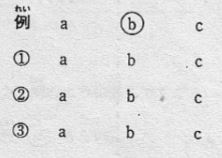
Script and answer
例
男:マリアさん、それは何ですか。
女:これ?これは絵はがきです。友達に出します。
男:日本語で書きましたか。
女:いいえ、まだ下手ですから、英語で書きました。
a. 女の人は日本語で書きました。
b. 女の人は英語で書きました。
c. 女の人は中国語で書きました。
otoko : Maria-san, sore wa nan desuka.
onna : kore? Kore wa ehagaki desu. Tomodachi ni dashimasu.
otoko : Nihongo de kakimashitaka.
onna : iie, mada heta desu kara, eigo de kakimashita.
a. Onna no hito wa Nihongo de kakimashita.
b. Onna no hito wa Eigo de kakimashita.
c. Onna no hito wa Chuugokugo de kakimashita.
Man : Maria, what’s that?
Woman : This one? This is a picture postcard. I’m going to send it to my friend.
Man : Did you write in Japanese?
Woman : No, I’m still bad at Japanese, so I wrote in English.
a. The woman wrote in Japanese.
b. The woman wrote in English.
c. The woman wrote in Chinese.
①
男:この白いものは何ですか。チーズですか。
女:いいえ、チーズじゃありません。とうふです。
男:何で作りますか。牛乳ですか。
女:いいえ、大豆で作ります。
男:そうですか。
a. 大豆はとうふで作ります。
b. とうふは大豆で作ります。
c. とうふは牛乳で作ります。
otoko : kono shiroi mono wa nan desuka. Chiizu desuka.
onna : iie, chiizu jaarimasen. Toufu desu.
otoko : nan de tsukurimasuka. Gyuunyuu desuka.
onna : iie, daizu de tsukurimasu.
otoko : soudesuka.
a. Daizu wa toufu de tsukurimasu.
b. Toufu wa daizu de tsukurimasu.
c. Toufu wa gyuunyuu de tsukurimasu.
Man : What is that white thing? Cheese, right?
Woman : No, it is not cheese. It’s tofu.
Man : What is it made from? It’s made from milk, right?
Woman : No, it’s made from soybean.
Man : Oh really.
a. Soybean is made from tofu.
b. Tofu is made from soybean.
c. Tofu is made from milk.
②
女:おはようございます。いつも早いですね。何時に学校に来ますか。
男:そうですね、8時ごろ来ます。
女:じゃ、何時に家を出ますか。
男:7時少し前です。
a. 男の人はいつも8時ごろ家を出ます。
b. 男の人はいつも7時ごろ学校に来ます。
c. 男の人はいつも8時ごろ学校に来ます。
otoko : ohayou gozaimasu. Itsumo hayai desu ne. Nanji ni gakkou ni kimasuka.
onna : soudesu ne, hachiji goro kimasu.
otoko : ja, nanji ni ie wo demasuka.
onna : shichiji sukoshi mae desu.
a. Otoko no hito wa itsumo hachiji goro ie wo demasu.
b. Otoko no hito wa itsumo shichiji goro gakkou ni kimasu.
c. Otoko no hito wa itsumo hachiji goro gakkou ni kimasu.
Woman : Good morning. You are always early, aren’t you? What time do you come to school?
Man : I come to school around 8 o’clock.
Woman : What time do you leave home?
Man : Just before 7 o’clock.
a. The man always leave home around 8 o’clock.
b. The man always come to school around 7 o’clock.
c. The man always come to school around 8 o’clock.
③
男:今、何時ですか。
女:もう5時半ですよ。音楽会は6時からですね。
男:ええ。時間がありませんから、タクシーで行きませんか。
女:そうですね。でもこの辺はタクシーはあまり来ませんよ。
男:じゃ、バスで行きましょうか。
女:そうですね。あ、あそこに地下鉄の入口がありますよ。地下鉄で行きましょう。
男:じゃ、そうしましょう。
a. 二人はタクシーで行きます。
b. 二人は地下鉄で行きます。
c. 二人はバスで行きます。
otoko : ima, nanji desuka.
onna : mou gojihan desu yo. Ongakukai wa rokuji kara desu ne.
otoko : ee. Jikan ga arimasen kara, takushii de ikimasenka.
onna : soudesu ne. Demo kono hen wa takushii wa amari kimasen yo.
otoko : ja, basu de ikimashouka.
onna : soudesu ne. A, asoko ni chikatetsu no iriguchi ga arimasu yo. Chikatetsu de ikimashou.
otoko : ja, sou shimashou.
a. Futari wa takushii de ikimasu.
b. Futari wa chikatetsu de ikimasu.
c. Futari wa basu de ikimasu.
Man : What time is it now?
Woman : It’s half past five. The concert starts at 6 o’clock, right?
Man : Yes. We don’t have time left, shall we go by taxi?
Woman : I agree. But taxis don’t often come to this area.
Man : Then shall we go by bus?
Woman : Yeah. Ah, there is a subway entrance over there. Let’s go by subway.
Man : Let’s do that.
a. They will go by taxi.
b. They will go by subway.
c. They will go by bus.
Answer
1-b 2-c 3-b
Japanese basic listening practice lesson 10
3. 会話を聞いて質問の答えを選んでください。
Kaiwa o kiite shitsumon no kotae wo erande kudasai.
Choose the correct answer from a, b and c.
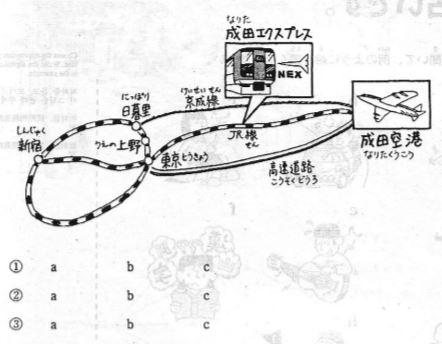
Script and answer
男:やあ、リーさん、どちらへ?
otoko : yaa, Riisan, dochira e?
Man : Ms. Lee, where are you going?
女:ええ、ちょっと、成田まで。
onna : ee, chotto, Narita made.
Woman : I’m going to Narita.
男:えっ?もう国へ帰りますか。
otoko : e-? Mou kuni e kaerimasuka.
Man : Huh? Are you going back to your country now?
女:いいえ、友達を迎えに行きます。
onna : iie, tomodachi wo mukae ni ikimasu.
Woman : No, I’m going to pick up my friend.
男:ああ、そうですか。何で行きますか。
otoko : aa, soudesuka. Nani de ikimasuka.
Man : Oh, I see. How do you get there?
女:新宿から成田エクスプレスで行きます。
onna : Shinjuku kara Narita ekusupuresu de ikimasu.
Woman : I will go by Narita express from Shinjuku.
男:どのくらいかかりますか。
otoko : dono kurai kakarimasuka.
Man : How long does it take?
女:そうですね、1時間ちょっとです。
onna : soudesu ne, ichijikan chotto desu.
Woman : Well, it takes a little over an hour.
男:そうですか。では気をつけて。
otoko : soudesula. Dewa ki wo tsukete.
Man : Oh really. Be careful.
では、質問です。選んでください。
① リーさんは何をしに成田に行きますか。正しいものに〇をつけてください。
a. 成田に飛行機を見に行きます。
b. 成田に友達を迎えに行きます。
c. 成田に写真をとりに行きます。
Riisan wa nani wo shi ni Narita ni ikimasuka. Tadashii mono ni 〇 wo tsukete kudasai.
a. Narita ni hikouki wo mi ni ikimasu.
b. Narita ni tomodachi wo mukae ni ikimasu.
c. Narita ni shashin wo tori ni ikimasu.
What is Ms. Lee going to Narita for? Circle the correct answer.
a. To see the airplane.
b. To pick up her friend.
c. To take photos.
② リーさんは成田まで何で行きますか。
a. バスで行きます。
b. タクシーで行きます。
c. 成田エクスプレスで行きます。
Riisan wa Narita made nani de ikimasuka.
a. Basu de ikimasu.
b. Takushii de ikimasu.
c. Narita ekusupuresu de ikimasu.
How does Ms. Lee get to Narita?
a. By bus.
b. By taxi.
c. By Narita express.
③ 新宿から成田までどのくらいかかりますか。
a. ちょうど1時間かかります。
b. 1時間かかりません。
c. 1時間と少しです。
Shinjuku kara Narita made dono kurai kakarimasuka.
a. Choudo ichijikan kakarimasu.
b. Ichijikan kakarimasen.
c. Ichijikan to sukoshi desu.
How long does it take to get to Narita from Shinjuku?
a. It takes just 1 hour.
b. It doesn’t take 1 hour.
c. It takes a little over an hour.
Answer
1-b 2-c 3-c
4. ひらがなで書いてください。
Hiragana de kaite kudasai.
Fill in the blanks using hiragana.
わたしはいま、東京( )………………..。ことし( )4月( )コンピューター( )勉強( )………………..。毎朝8時( )うち( )………………..。バス( )大学( )………………..。9時( )研究室( )………………..。毎日………………..です。
Script and answer
わたしは今、東京(に)います。今年(の)4月(に)コンピューター(の)勉強(に)きました。毎朝8時(に)うち(を)でます。バス(で)大学(に)いきます。9時(に)研究室(に)はいります。毎日 いそがしいです。
Watashi wa ima, Toukyou ni imasu. Kotoshi no shigatsu ni konpyuutaa no benkyou ni kimashita. Maiasa hachiji ni uchi wo demasu. Basu de daigaku ni ikimasu. Kuji ni kenkyuushitsu ni hairimasu. Mainichi isogashii desu.
I’m in Tokyo now. I came here to study computer in April of this year. Every morning, I leave home at 8 o’clock. I go to university by bus. I come to the classroom at 9 o’clock. I’m busy every day.
Above is : Japanese basic listening practice lesson 10. See other similar lessons at category : Japanese listening practice or Japanese basic listening practice
Stay with us on :
Facebook - Twitter - Pinterest - Reddit
